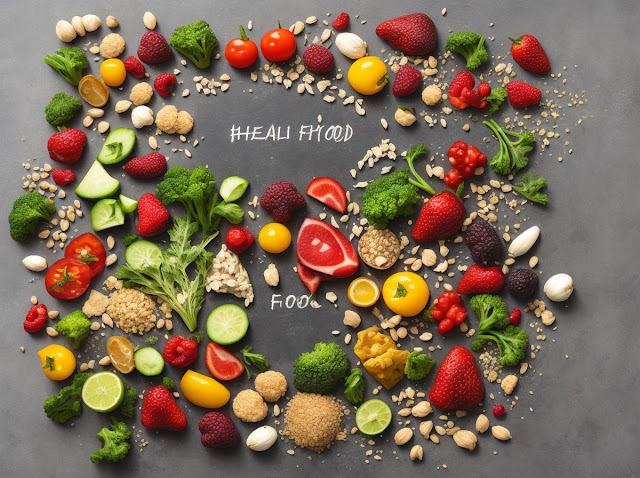Where Food Meets Beauty in Style
Title: Embracing a Healthier Lifestyle: The Transformative Power of Nutrient-Rich Foods
Introduction:
In our fast-paced modern world, the significance of adopting
a healthy lifestyle cannot be overstated. At the core of this endeavor lies the
key to well-being – a balanced and nutritious diet. Healthy food is the
foundation for a robust immune system, sustained energy levels, and overall
vitality. In this article, we will delve into the multifaceted benefits of
consuming nutrient-rich foods, explore the components of a well-balanced diet,
and provide practical tips for incorporating healthy choices into your daily
routine.
 |
The Importance of Nutrient-Rich Foods:
Nutrient-rich foods are a cornerstone of a healthy diet,
supplying the body with essential vitamins, minerals, antioxidants, and other
vital compounds. These foods play a pivotal role in promoting overall health
and preventing various chronic diseases. Embracing a diet rich in nutrients
supports optimal organ function, aids in the maintenance of a healthy weight, and contributes to mental well-being.
Vitamins and Minerals:
One of the primary advantages of
consuming a diverse array of nutrient-rich foods is the intake of essential
vitamins and minerals. These micronutrients are crucial for various
physiological processes, such as immune function, bone health, and metabolism.
Fruits, vegetables, whole grains, and lean proteins are excellent sources of
vitamins like A, C, D, E, and minerals such as calcium, magnesium, and
potassium.
Antioxidants:
Berries, leafy greens, nuts, and seeds are abundant in
antioxidants, which contribute to cellular health and may help reduce the risk
of chronic diseases, including heart disease and certain cancers.
Fiber:
Fiber is an integral component of a healthy diet, aiding in
digestion, promoting a feeling of fullness, and supporting heart
health. Including these foods in your diet can help regulate blood sugar levels,
lower cholesterol, and maintain a healthy digestive system.
Components of a Well-Balanced Diet:
Achieving a well-balanced diet involves incorporating a
variety of nutrient-rich foods from different food groups. The following
components contribute to a diet that nourishes the body and supports overall
health:
Fruits and Vegetables:
These foods contribute to hydration, aid digestion, and
provide essential phytochemicals that have numerous health benefits.
Whole Grains:
Whole grains, such as brown rice, quinoa, oats, and whole
wheat, are excellent sources of complex carbohydrates, fiber, and various
nutrients. Choosing whole grains over refined grains helps regulate blood sugar
levels and provides sustained energy throughout the day.
Balancing protein intake with other food groups is key to a
well-rounded diet.
Healthy Fats:
Limit saturated and trans fats found in processed and fried
foods, as they can negatively impact cardiovascular health.
Practical Tips for Incorporating Healthy Choices:
Here are some practical tips to help you make sustainable and positive changes to your eating habits:
Plan and Prepare:
Prepare meals at home using fresh ingredients to have better control over the nutritional content of your food.
Gradual Changes:
Rather than making drastic changes overnight, consider
incorporating healthy choices gradually. This approach makes adjusting to new eating habits easier and increases the likelihood of long-term success.
Mindful Eating:
Avoid distractions such as screens while eating, savor the flavors of your food, and listen to your body's signals.
Moderation:
Enjoying a variety of foods in moderation is key to a sustainable and balanced diet. Indulge in your favorite treats occasionally, but be mindful of portion sizes and overall nutritional intake.
Conclusion:
In conclusion, embracing a healthy lifestyle through the
consumption of nutrient-rich foods is a transformative journey that positively
impacts physical, mental, and emotional well-being. A well-balanced diet, rich
in vitamins, minerals, antioxidants, and other essential nutrients, provides
the body with the tools it needs to thrive. By making informed food choices,
incorporating a variety of whole foods, and adopting mindful eating habits,
individuals can embark on a path to lasting health and vitality.

Comments
Post a Comment